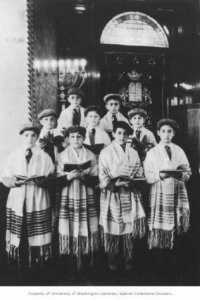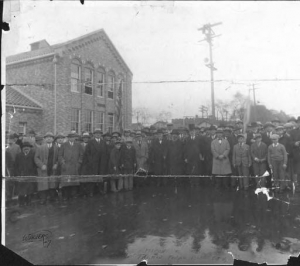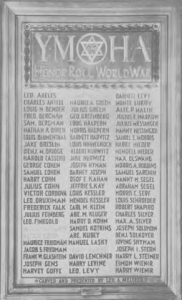Shortly after the American stock market crashed in 1929, many parts of the world fell into a state of economic depression. During this time period, Seattle’s Jewish organizations struggled to stay in tact as many took loans to cover operating expenses.
One Jewish organization that struggled during the Great Depression was The Seattle Talmud Torah Hebrew School. While finding money to start building the Talmud Torah building was not difficult in the 1920s, completing construction of the building in 1930 put Talmud Torah Hebrew School in debt at the beginning stages of the Great Depression. Scrambling to pay debts on the new building, leaders of the new Talmud Torah Hebrew School began to ask members of the Jewish community to help. While some wealthier members of Seattle’s Jewish community were able to lend the organization money, many of Seattle’s Jews at the time sent letters to the Talmud Torah Hebrew school to tell the school that they did not have enough money to pay membership dues. As the organization struggled to pay back debt throughout the 1930s, many of Talmud Torah’s Hebrew School employees went unpaid for extended periods of time. Although budget cuts and debt plagued Seattle Talmud Torah Hebrew School during the great depression, the school continued to celebrate Jewish holidays religiously and allowed people to attend classes even if they did not have the money to afford it.
As the Great Depression continued through the 1930s, Jews across the United States were also facing increasing levels of antisemitism. A 1939 Roper poll found that 53% of Americans thought that Jews should be treated differently Christians and 10% of Americans believed Jews should be deported (Roper poll, 1939). In Seattle, antisemitic sentiments resulted in Jewish organizations making efforts to prove their loyalty to America. During this time period Jewish organizations began displaying patriotic plaques like the one below to display the patriotism of the Jews during the First World War (Wegner, 1999).
While the Great Depression was one of the most difficult times for Jews in the United States, very little has been written about Jews in Seattle during this time period. However, during the great depression many of Seattle’s Jews moved out of downtown Seattle to surrounding areas. My research aims to understand how Jews in Seattle responded to the Great Depression. How did various Jewish organizations at the time deal with high levels of debt, declining membership contributions, and American antisemitic sentiments?
In my research I have read through the minutes from Congregation Bikur Cholim, Temple De Hirsch, and Seattle Talmud Torah Hebrew School to find out how the organizations responded to the Great Depression. This material revealed that all three organizations experienced high levels of debt and did not pay many of the staff members during months when the budget could not be balanced. Additionally, annual celebrations had to be cut and loans had to be taken from wealthy members of the Jewish community to keep the organizations afloat. However, these organizations were not willing to sacrifice the celebration of Jewish holidays, education, or their Boy’s Choir. I have also found archival material on some of Seattle’s wealthiest Jews during the Great depression to find out that many of them had trouble making money during the worst years of the great depression. Tax records from the Levy family show that their investments failed to turn profits during the first few years of the Great Depression but contributed generous amounts of money to Jewish organizations in the mid to late 1930s. Despite financial strain during the Great Depression, organizations like Temple De Hirsch, Congregation Bikur Cholim, and Seattle Talmud Torah Hebrew school sacrificed celebrations, income, and put themselves in debt but always emphasized the maintenance of schools.
I have also found archival material on some of Seattle’s wealthiest Jews during the Great depression to find out that many of them had trouble making money during the worst years of the great depression. Tax records from the Levy family show that their investments failed to turn profits during the first few years of the Great Depression but contributed generous amounts of money to Jewish organizations in the mid to late 1930s. Despite financial strain during the Great Depression, organizations like Temple De Hirsch, Congregation Bikur Cholim, and Seattle Talmud Torah Hebrew school sacrificed celebrations, income, and put themselves in debt but always emphasized the maintenance of schools.
[two_third last=yes]


